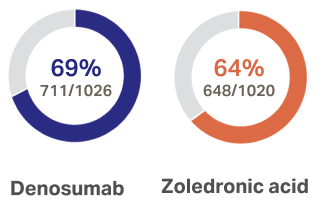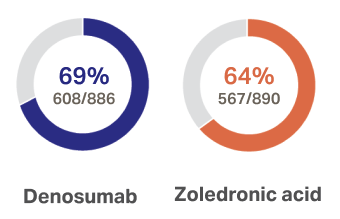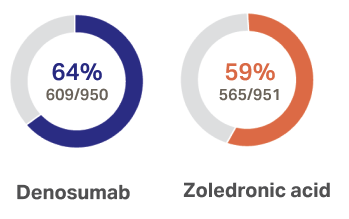IMPORTANT SAFETY INFORMATION
If you receive OSENVELT, you should not receive other denosumab products at the same time.
OSENVELT can cause serious side effects including:
Serious allergic reactions. Serious allergic reactions have occurred with
denosumab products. Call your doctor or seek emergency care immediately if you experience symptoms such as low
blood pressure (hypotension), rash, difficulty breathing, itching, throat tightness, hives, or swelling of
your face, lips, or tongue.
Low blood calcium (Hypocalcemia). OSENVELT can lower your blood calcium levels,
which can become severe or even life-threatening. Your doctor will check your calcium levels before and during
treatment, especially in the first few weeks. You may need to take calcium, magnesium, and vitamin D
supplements as instructed by your doctor. Your risk may be higher if you have kidney problems or take other
medicines that lower blood calcium. Call your doctor immediately if you experience symptoms of low blood
calcium, such as muscle spasms or cramps, numbness or tingling in fingers, toes, or around your mouth,
twitching or stiffness.
Severe jawbone problems (osteonecrosis). Severe jaw bone problems may happen
when you take OSENVELT. Your doctor should examine your mouth before starting treatment and may advise seeing
a dentist. Practice good oral care and consult your doctor or dentist if needed.
Unusual thigh bone fractures. Symptoms include new or unusual pain in your hip,
groin, or thigh.
High Blood Calcium After Stopping Treatment. If you have giant cell tumor of
bone or are still growing, stopping OSENVELT can lead to high calcium levels in your blood (hypercalcemia).
This condition can become severe, require hospitalization, and affect your kidneys. Your doctor will monitor
your calcium levels after stopping treatment. Call your doctor right away if you notice symptoms of high blood
calcium, such as nausea or vomiting, increased thirst or urination, confusion or tiredness, muscle weakness or
pain. Follow your doctor's instructions carefully, and keep all scheduled appointments for calcium monitoring.
Multiple Spine Fractures After Stopping OSENVELT. After stopping treatment with
OSENVELT, some patients have experienced multiple spine fractures. Your risk is higher if you have
osteoporosis, previous fractures, or other risk factors. Your doctor will assess your individual fracture risk
when stopping OSENVELT.
Risk to Unborn Babies. OSENVELT may harm your unborn baby if you take it while
pregnant or within 5 months before becoming pregnant. Animal studies have shown serious harm, including
pregnancy loss, birth defects, abnormal bone growth, missing lymph nodes, and slow growth after birth. Your
doctor will check if you are pregnant before starting OSENVELT. Tell your doctor immediately if you become
pregnant or think you may be pregnant during treatment.
Do not take OSENVELT if you have low blood calcium, are pregnant or planning
pregnancy, or if you're allergic to denosumab or any ingredients in OSENVELT.
Before taking OSENVELT, tell your doctor if you:
- take other denosumab products
- have low blood calcium
- cannot take daily calcium and vitamin D supplements
- take medicines that can lower blood calcium
- plan dental surgery or tooth removal
-
are pregnant, planning pregnancy, or breastfeeding. OSENVELT may harm an unborn baby; a pregnancy
test is required before treatment; use effective birth control during treatment and for 5 months
after your last dose; inform your doctor immediately if pregnancy occurs. It is unknown if OSENVELT
passes into breast milk; do not breastfeed during treatment.
Tell your doctor of all medicines, vitamins, and herbal supplements you take.
Keep an updated list to share with healthcare providers.
The most common side effects of OSENVELT are:
For patients with Bone Metastasis from Solid Tumors: fatigue or weakness, low
phosphate levels, and nausea.
For patients with Multiple Myeloma: diarrhea, low phosphate, nausea, fatigue,
low calcium, shortness of breath, and anemia.
For patients with Giant Cell Tumor of Bone: joint pain, headache, nausea, back
pain, fatigue, and pain in arms or legs.
For patients with Hypercalcemia of Malignancy: nausea, trouble breathing,
decreased appetite, and headache.
Tell your doctor if side effects are bothersome or persistent. These are not all possible side effects. Call
your doctor for advice on side effects or report them to the FDA at
1‑800‑FDA‑1088.
Please see full Prescribing Information and talk with your healthcare provider.




